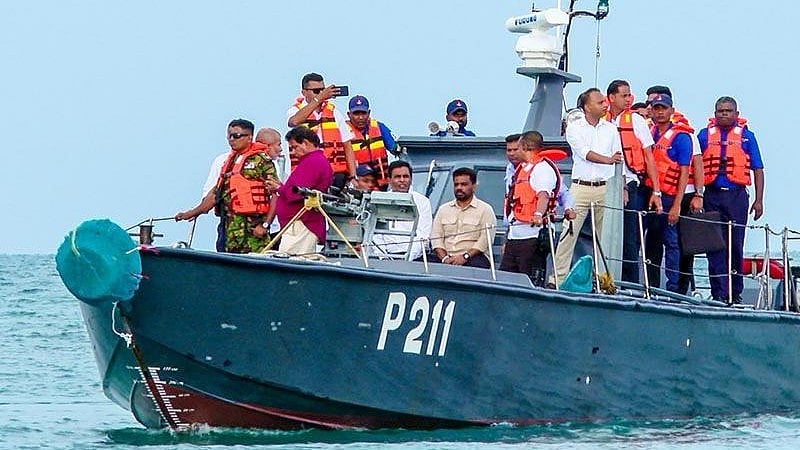
The Sri Lankan President made an unprecedented visit to Katchatheevu.
Credit: Presidential Secretariat, Sri Lanka.
Chennai: In a move that could upset India, Anura Kumara Dissanayake on Monday became the first Sri Lankan President to set foot on Katchatheevu, an uninhabited island just 285 acres sandwiched between two countries in the Palk Bay.
Before his unscheduled visit to the island, which was ceded to Sri Lanka by India in 1974, Dissanayake also asserted that his government will not yield to any pressure regarding demands over retrieval of the island in Tamil Nadu and maintained that he would safeguard Sri Lanka’s territory.
The unprecedented visit by the Sri Lankan President to an island just a 45 minute speed boat ride from Rameswaram in Tamil Nadu is unlikely to be welcomed by India, which has been walking the extra mile to maintain its relationship with Sri Lanka. India has never questioned Sri Lanka’s ownership over Katchatheevu after 1974, but has urged Colombo to adopt a humanitarian approach towards Tamil Nadu fishermen who cross into the island nation’s waters to fish.
Dissanayake’s visit has sparked fears of renewed attacks by the Sri Lankan Navy on fishermen from Ramanathapuram, Pudukkottai, Thanjavur, and Nagapattinam districts. Representatives of fishermen associations demanded that the Union Government hold talks with its Sri Lankan counterpart to ensure that the Sri Lankan Navy doesn’t take Dissanayake’s visit as a “free pass” to attack fishermen fishing near Katchatheevu.
“Katchatheevu is our land. This area belongs to the people of Sri Lanka. We will not allow anyone to take it by force. It is my responsibility to protect the people of Sri Lanka, regardless of the region they live in or the language they speak,” Dissanayake told Tamils in northern Sri Lanka on Monday before visiting the island.
Accompanied by defence staff, Dissanayake was seen strolling around the island, which was once owned by the Rajah of Ramanathapuram, and visiting St Antony’s Church, the only structure in Katchatheevu.
While Dissanayake’s visit is seen as a clear message to India that Sri Lanka will never backtrack on the issue of Katchatheevu, the development comes amid repeated calls by Tamil Nadu Chief Minister M K Stalin and other political leaders for retrieval of the island. Newbie politician actor Vijay had on August 21 jumped onto the bandwagon by demanding that Prime Minister Narendra Modi take steps to reclaim the island. In fact, Modi himself had raked up the issue ahead of the 2024 polls.
N Sathiya Moorthy, a strategic expert who has rich experience of covering Sri Lanka, told DH that Dissanayake’s visit to Katchatheevu was an avoidable irritant in relations with India. “If Dissanayake thought he was winning over the Tamils in Sri Lanka and the fisherfolk, he is mistaken. They don’t actually care about Katchatheevu. Their opposition to Indian fishermen entering Sri Lankan waters is only due to their fishing methods (bottom trawlers),” he said.
Sathiya Moorthy believes Dissanayake is using the Sri Lankan Tamils and Katchatheevu as a diversion amid efforts to unite opposition parties in Sri Lanka following the arrest of his predecessor Ranil Wickremesinghe.
N J Bose, secretary, Tamil Nadu Boat Fishermen's Welfare Association, told DH that Dissanayake’s visit to Katchatheevu is nothing but a direct response to demands in Tamil Nadu to reclaim the island. “We are worried what will happen to our fishermen who fish near Katchatheevu because of the good fish catch there. While Sri Lanka asserts itself, India remains silent as always, compromising the safety and rights of its fishermen. We want India to solve the issue,” he added.
Katchatheevu is a tiny uninhabited island of just 285 acres sandwiched between India and Sri Lanka in the Palk Bay. Originally part of the territory held by the Rajah of Ramanathapuram, Katchatheevu was brought under the Madras Presidency during British rule.
In 1974, Katchatheevu was recognised as Sri Lanka territory and two years later, the island was declared a ‘No Go Zone’ for Indians in 1976 after the two countries reached another agreement, in a blow to fishermen who have enjoyed access to the island for long.